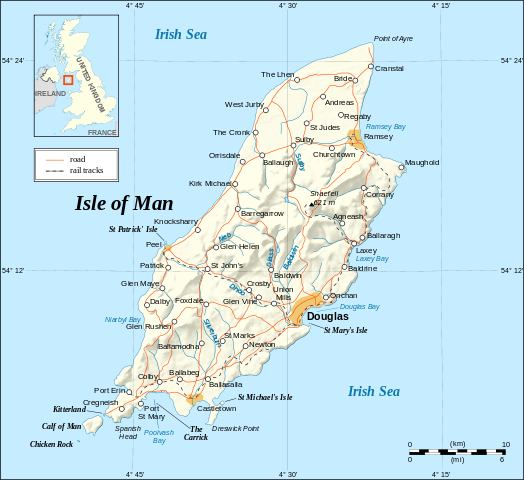Manx: Bringing a language back from the dead
Condemned as a dead language, Manx – the native language of the Isle of Man – is staging an extraordinary renaissance.
Read more here.
My Swedish book collection
I have decided that I will make a point of buying books in my own language (Swedish). It’s not that easy anymore. When I was a child, I was given plenty of great books on birthdays and Christmas. My mum had bought me so many books, before I could even read, so I had a head start on my Swedish book collection. These days I struggle to find good books in Swedish. The ‘toplist’ is artificially made up by the big publishers. It no longer consists of the best selling books, but the ones the publishers would like to sell best. And apparently, their criteria for publishing a book is not quality, it’s saleability.
However, I’m doing my best looking for Swedish children’s and YA books, non fiction and – naturally – fantasy, science fiction and mysteries. They’re usually more expensive than books in English, naturally enough, since the editions are much smaller. I usually can’t find books of the very highest quality either. It’s sad, but true. But I really want to have a Swedish book collection so it’s going to be worth it in the end. I also want to have smaller collections of French and German books, maybe others too. Fortunately, those aren’t usually that much more expensive than English/American books. Clearly, French and German are big enough languages to produce large enough editions of every title.
My ‘policy’ when it comes to book buying is to, as far as possible, get books in the original language, and if I can’t read the original language, the one I know best. I’ll make an exception if the Swedish translation is far less expensive than the original. Some years ago, there was this Chinese book I really wanted to read. Naturally, I can’t read any Chinese language, so I looked around for an English translation (unsurprisingly there wasn’t one in Swedish), but there wasn’t one. Fortunately, there was one in French, so I bought that.
Remember Your Favorite Teacher? Today’s a Good Day to Say Thank You
Read more here.
I’d like to take this opportunity to mention my junior high (or rather the Swedish equivalent) French and English teacher. He was awesome. We had so much fun the three years he taught us French and English. Just to mention one thing, one day per week we got to just ‘play’ with the language – making collages. Thank you very much, sir. It was great being your student.
Advice for writers
To observe the world carefully, to write a lot and often, on a schedule if necessary, to use the dictionary a lot, to look up word origins, to analyze closely the work of writers you admire, to read not only contemporaries but writers of the past, to learn at least one foreign language, to live an interesting life outside of writing.
—
Lydia Davis when asked what advice she has for young writers
Ten words not found in English (sort of)
I just read this article on the Local. It was quite interesting, despite the snarky tone that I’m more used to from the Guardian’s site. Actually, I never thought about most of these words (and ‘vabba’ is relatively new). I won’t go into the pronunciation (but if you’re curious, comment and I’ll try to explain).
I’ll add ‘lagom’ – a sort of “Goldilocks” word, meaning ‘just right’. ‘Duktig’ reminds me of a word in LOTR (the book) – doughty. I’m sure they have the same base, even though doughty can’t be used very often in English-speaking countries today.
For those of you who don’t like The Local’s site, these are the words:
Orka (have the strength to, feel up to)
Harkla (clearing one’s throat)
Hinna (have time to, or ‘catch’ as in ‘I managed to catch the bus’ – in the latter case with the addition ‘med’, in this case meaning ‘to’ but normally it means something else)
Blunda (closing one’s eyes/to close one’s eyes or close your eyes!)
Mysa (snuggle/cuddle, but also enjoying oneself)
Vabba (this simply means taking a paid day off to take care of one’s sick child, it used to be an acronym then turned into a verb)
Duktig (skillful, good at etc, often used when referring to child, but also as a polite remark ‘vad duktig du är’ – ‘oh, you’re good’ (at something or other)
Jobbig (tiresome – actually I think that pretty much covers it, so it’s a bad example)
Gubbe/Gumma (old man/old woman, can be used as a derogatory term, but also as a term of endearment meaning little ‘old man’ or little ‘old woman’ when you use it about a child or dog etc, some people mainly use it as a colloquial term for husband/wife (“hubby” etc)
Also:
Specific words for maternal grandmother (mormor eg ‘mothermother’), maternal grandfather (morfar eg ‘motherfather’), paternal grandmother (farmor eg ‘fathermother’) and finally paternal grandfather (farfar eg ‘fatherfather’). As they point out in the article, grandchild is called barnbarn – eg ‘childchild’ as in (my) child’s child. You can also say daughter’s daughter ‘dotterdotter’, daughter’s son ‘dotterson’, son’s daughter and son’s son ‘sondotter and sonson’. It may look funny, but I think it makes sense.
Today’s Swedish word: tröja
Today’s Swedish word: tröja (n. sweater, jumper, t-shirt). The “ö” is pronounced somewhat like the vowel in “word”.”stir” etc.
Swedish
Since I have come to realize that some people are actually quite interested in learning Swedish, I thought I’d start a little series: Today’s Swedish word. I’ll post one Swedish word and explain it briefly. Just a word of warning – even if it’s called Today’s Swedish word, it doesn’t mean I’ll be posting every day. I’ll post whenever I feel inspired, as usual.
Language
I’m doing a complete reconstruction of an old site, and I decided to use some of the stuff from my ‘language’ site here instead. The content is more suitable for a blog anyway.
So here goes. If you’re interested in language study, you might find this interesting.
I thought I’d tell you a little about the languages I’ve studied and others that I find interesting. To me, learning languages has turned out to be habit forming. I like to, in a way, collect languages. Two or three isn’t enough. I want to know many. Of course I realize that I’m lucky not to find it too difficult, up to a point. Unfortunately, I haven’t managed to become fluent in any language, other than my own – Swedish, and English, (or as I prefer to call it – Anglo).
It’s not just the language in itself that I think is fun. When you study a language, you learn a lot about the country or countries where the language is spoken. The literature, the art, the music, the history – all kinds of things are a part of the language studies.

Why I write
I write because all the time, my mind is full of stories. I’m always thinking “what if things were like this instead”. A writer has full control over her created world. Since personally, I lack control over my life, no matter how hard I try, how much I struggle, I like to have control somewhere.
Writing is creating, and I can’t create anything else.
Besides, languages are my life. I love learning languages, but so far I can only write in two languages. If I had my wish, I’d like to be able to write in all my languages, but I realize that really only the two I already master are ‘useful’.
One reason I write (and create stories inside my head) is that I can’t stand myself the way I am or my life the way it is. When I write I re-shape my reality so I can go on living.
I write because it’s one of the few things that makes me feel happy and proud over myself. It’s one of the few things I’m good at. That means I feel successful according to my own definition. And that’s the only way to feel successful.
I love putting together the plot and develop the characters. Even though I love languages, it’s the plot, the characters and their dialogue that interests me the most.
Writing enables you to add your own opinions, that no one ever ask you for, to your story, and be able to say what you feel, and perhaps even influence others. If you look at the works of literature that have survived through history, they’ve had an enormous influence on posterity, even if their own time ignored them and their authors. I’m able to leave a lasting legacy.
I write because it’s almost the only thing that can make me forget the world around me. Writing makes me vanish into a different and better world.
Learning things develops the brain, but so does creating things. And if you learn things that you can use in your writing, it’s doubly useful.
What one person writes could never have been written by anyone else. It’s always entirely unique and specific to the author. Creating something unique is a fantastic feeling.
Second Life – a Language School?
It’s kind of funny. I’ve been a member of a number of different language sites and I still use one regularly. Many different people contact me, wanting to ‘learn’ Swedish, without taking any classes. Some just want to practice their English. No one stays in touch for long. I can’t say I’ve had much use for the exchange.
Strangely enough, in the relatively short time I’ve been in Second Life, I’ve already felt that I can express myself more freely, especially in French and Spanish. Not as much in Italian and German, but at least there’s some improvement.
I don’t have that many close friends in SL, but that doesn’t really matter. The constantly new people who want advice or help or – in some cases- who want to help me, will ask or tell me things in their languages. I need to find the right words or expressions quickly, almost as if I was in France or Spain or wherever it is.
Sure I need to let go of my demands for perfection. My sentences tend to be simple and basic, as I used to express myself in the years before I first went to school (when it comes to Swedish) or the first years of learning English (roughly ten to thirteen).
That’s not really a problem. I can make myself understood and my brief acquaintances appreciate the fact that I respond in their languages. It might be hard to believe, but there are some ‘residents’ of SL who aren’t fluent in English.
This even made me want to learn Portuguese too. Several times I’ve been unable to chat with the Brazilians who get in touch, hoping I’m a Portuguese speaker too. Who knows, some of those people might be really nice.
So, now I can add another advantage to being in SL. In a way, it’s a pretty good language school. If this is making you a bit curious, why don’t you drop in? There’s just one thing – you’ll need a quite modern and strong computer. Other than that, it’s not difficult. Besides, if you’re not that good at for instance English, there will most likely be people from your country in world already. Search for groups for people from your country or people speaking your language and join them. From the start, you’ll have some people to talk to.

